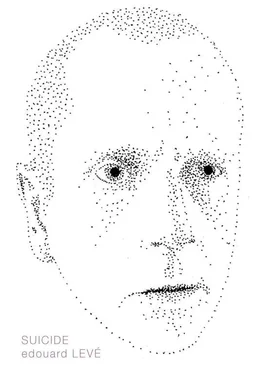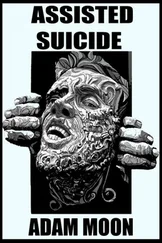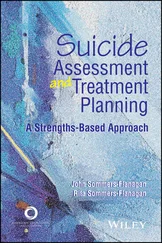Édouard Levé - Suicide
Здесь есть возможность читать онлайн «Édouard Levé - Suicide» весь текст электронной книги совершенно бесплатно (целиком полную версию без сокращений). В некоторых случаях можно слушать аудио, скачать через торрент в формате fb2 и присутствует краткое содержание. Город: Lonton, Год выпуска: 2011, ISBN: 2011, Издательство: Dalkey Archive Press, Жанр: Современная проза, на английском языке. Описание произведения, (предисловие) а так же отзывы посетителей доступны на портале библиотеки ЛибКат.
- Название:Suicide
- Автор:
- Издательство:Dalkey Archive Press
- Жанр:
- Год:2011
- Город:Lonton
- ISBN:978-1-56478-628-9
- Рейтинг книги:3 / 5. Голосов: 1
-
Избранное:Добавить в избранное
- Отзывы:
-
Ваша оценка:
- 60
- 1
- 2
- 3
- 4
- 5
Suicide: краткое содержание, описание и аннотация
Предлагаем к чтению аннотацию, описание, краткое содержание или предисловие (зависит от того, что написал сам автор книги «Suicide»). Если вы не нашли необходимую информацию о книге — напишите в комментариях, мы постараемся отыскать её.
, just a few days before he took his own life.
Suicide
Suicide
Suicide — читать онлайн бесплатно полную книгу (весь текст) целиком
Ниже представлен текст книги, разбитый по страницам. Система сохранения места последней прочитанной страницы, позволяет с удобством читать онлайн бесплатно книгу «Suicide», без необходимости каждый раз заново искать на чём Вы остановились. Поставьте закладку, и сможете в любой момент перейти на страницу, на которой закончили чтение.
Интервал:
Закладка:
You had hung up a portrait of your great-uncle in your study, on the wall behind the desk, so that when seated your back was turned to it. You used to say that this way it was him who looked at you, and not the other way round. His eyes were permanently fixed on you, and if you wanted to see him, you had to turn around. As such, when you looked at him, he received your frank, sustained attention, bearing no resemblance to the furtive glances you gave him on entering the room.
In the town where you lived, there were neither psychoanalysts nor psychiatrists. You wondered whether your malaise could be attributed to a physical malfunction. You made an appointment with a general practitioner who prescribed you antidepressants. You took them as an experiment. After a few days, you experienced a feeling of strangeness. You heard words leave your mouth as if they belonged to someone else. Your gestures were brusque. You approached your wife and suddenly took her in your arms. You embraced her violently and then rapidly detached yourself. She watched you brush her aside without understanding why, her arms held out toward you. You next picked up a book and started reading. The words on the page sketched out the lines of an abstract painting; their meaning escaped you. You put it back down; you went into the kitchen and made a sandwich that you didn’t eat. You went into the street to take a stroll, and you came back a few minutes later because you didn’t know why you had gone out. You smoked a cigarette that you put out after a few drags. You sat down at your work desk and reread the exchange rates before bringing out some bills that needed paying. Nothing kept your attention. You organized files. You thought of the long list of things you had to do without managing to discipline your mind. Agitation led you without logic from one action to another, so that you accomplished none. At night, you were too on edge for sleep. The first few days, you were turned gray by the lack of sleep, as one might be after having stayed up all night. But two weeks later, your sleep reserves had been entirely exhausted. Your insomnia had a mind-numbing effect. You became stupid. Your memory grew weaker. You labored to remember proper names, including those of people you knew well. It took you two days to recall the name of a friend whom you hadn’t seen for only a few months. Her face and her voice came to you without difficulty, but her name seemed never to have existed. You only found it by rereading your address book. You went back to the doctor’s office, he prescribed you a new antidepressant, which also acted as a sleeping pill. Taking it, you immediately found yourself in a deep sleep, but unfortunately you never really woke from it. During the day you floated in somnolence. You spoke in slow motion, you articulated poorly, you responded to questions only after a delay. Your bearing became heavier. You dragged your heels. Outside, you walked abnormally straight; you avoided obstacles at the last possible moment. Sometimes you disregarded them entirely. You walked through a puddle with indifference; you bumped into a lamppost with your shoulder. Pedestrians turned around to look at you in the street. You lived in an immediate present. Your memory of recent events became thin. You didn’t retain the stories just told you. In the middle of an anecdote you were being told, you asked yourself how it had begun. It was only when you repeated some questions, asked again about subjects your interlocutors had just mentioned, that your lacunae were discovered. One week after having started to take the new antidepressant, you had become a ghost. You only emerged from this coma in order to complain about the stupidity it had thrown you into. The doctor, whom you went back to see, prescribed you a third antidepressant. For the first week, no effect could be felt other than loss of sleep. But after the second week, you experienced abnormal excitement at unforeseeable moments. One day you woke up tired. You had slept for only two hours even though you had gone to bed early and had stayed lying down all night. You lived in slow motion until midday, when suddenly, for no reason, euphoria followed. You spoke fast; you busied yourself with random tasks. While on the phone with your mother, you continually modified the position of groceries in the fridge, all the time looking at the rest of the kitchen with a view to the radical changes you suddenly wanted to make to its decoration. Then you brusquely interrupted your conversation to go look for a shovel in the basement. You wanted to clear away a heap of earth in the garden, which had been there for months. The shovel could not be found, but you stumbled onto some moldy old crates that you decided to stack. You took the stack in your arms—it came up to above the top of your head—and walked blindly in the direction of the dump a kilometer away from your house. When you came back you noticed that you had left the doors wide open, and that a casserole was burning on the gas stove. This spectacle disheartened you. You sat down on the couch and felt a violent pain in your temples, as if a caliper were slowly tightening on them. You tapped your fingers on your head; it sounded hollow like a dead man’s skull. Suddenly, you no longer had a brain. Or rather, it was another person’s brain. You sat like this for two hours, asking yourself if you were yourself. A document sitting next to you on the couch, the edge of which extended into the air, caught your attention. It was the annual report of a big international bank. You didn’t know how it had gotten there, but you read it attentively. You didn’t really understand what you were reading. It was in French, but nonetheless resembled a foreign language. Having come to the end of this abstract text, which for you possessed the strange charm of poetry in another tongue, you got up and wanted to start a business. You left for the library in order to search through books on the legal statutes governing associations. It was closed, it was Sunday, but you hadn’t thought of that. You came back running; your legs were itching; you were overflowing with uncontrollable physical energy. You stopped in front of an old wall, out of which jutted a piece of flint, which you suddenly wanted to eat. It was when you were approaching the rock that you realized how strangely you were behaving. But you just as soon forgot about it. You again took up your uninhibited running. You were hot; it was a fine day; you found the sun exalting. You looked straight at it in defiance, like when you were a child. You had tears in your eyes. The slight pain pleased you. Bedazzlement transformed the street into a white monochrome through which you walked more slowly in order to appreciate its beauty. Colors returned gently, as in a cinematic special effect. This is what gave you the idea to walk in slow motion, to try out another special effect on your body. You took half an hour to reach your house; you crossed the garden like a tortoise. Your wife appeared on the doorstep and began to laugh. You let out an uncontrolled, crazy laugh, which stopped suddenly, and which baffled your wife. You spotted a shutter on which the paint had flaked off, and you undertook to repaint it. The darkness and smell of the junk room where you stored the paintbrushes suddenly brought you back to reality. The familiar smell made you remember your state of mind prior to the antidepressants. You realized how the euphoria they had created was artificial. The down periods that followed this enthusiasm were more intense than before. You had less control over yourself; the medication had taken possession of your moods. Was a little bit of fake happiness worth losing your free will? You decided to give up these chemical crutches, which either split you in two or made you stupid. But your body had become accustomed to them. You needed to make it through two weeks of exhaustion and various new anguishes before becoming yourself again.
Читать дальшеИнтервал:
Закладка:
Похожие книги на «Suicide»
Представляем Вашему вниманию похожие книги на «Suicide» списком для выбора. Мы отобрали схожую по названию и смыслу литературу в надежде предоставить читателям больше вариантов отыскать новые, интересные, ещё непрочитанные произведения.
Обсуждение, отзывы о книге «Suicide» и просто собственные мнения читателей. Оставьте ваши комментарии, напишите, что Вы думаете о произведении, его смысле или главных героях. Укажите что конкретно понравилось, а что нет, и почему Вы так считаете.












